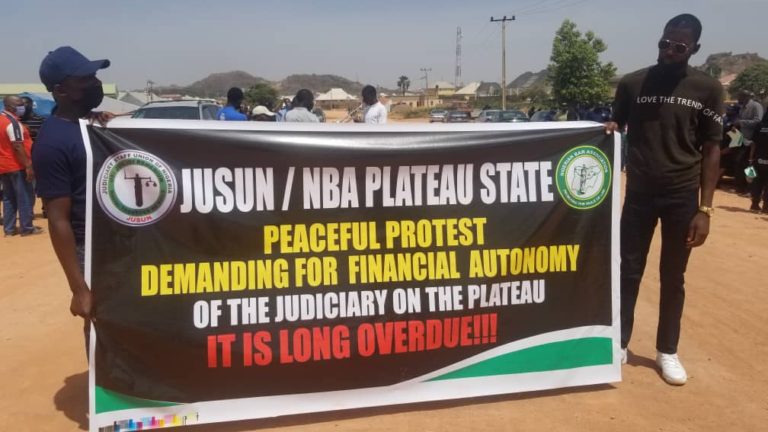STRUGGLE FOR THE AUTONOMY OF THE JUDICIARY AND PARLIAMENT: TASKS BEFORE NBA, JUSUN AND PASAN
MSA Reporters

The indefinite strike action of the Judiciary Staff Union of Nigeria (JUSUN), which effectively began to have its biting effect on 6th April 2021 has brought into demonstration workers’ power in the Judiciary. Courts were shut down and Judges, despite the bourgeois honour and privileges accorded to them, could not sit. Indeed, workers own the world but they are not yet conscious of their manifest powers.
The demands of the indefinite strike action which centred majorly on the financial autonomy of the Judiciary, provided under the Constitution of the Federal Republic of Nigeria (1999 as amended), opened a debate about the nature of the current bourgeois-democratic experience. The State Governors, utilizing their position as custodian of the financial purse of the State Governments, steal large allocations meant for the Judiciary and the Parliament at state levels and even the local government councils. The shutdown of the courts by JUSUN has also brought to the fore the lingering strike action of the Parliamentary Staff Association of Nigeria (PASAN), which is also agitating for the financial autonomy of the State Houses of Assembly.
The Nigerian Bar Association (NBA), which is the association of lawyers in Nigeria, after labelling the strike action of the judicial workers as “ill-timed”, changed its position to support the demand of the strike for financial autonomy of the Judiciary. The national leadership of the NBA directed all the Chairmen of the Branches to “pay a visit” to the respective Governors of their State Governments on each Mondays, starting with Monday 19th April, 2021.
The events of Monday, 19th April, 2021 saw protests by various branches of the NBA in different parts of the country with reports of refusal of Governors to attend to them. The day also saw separate protests by the national leadership of the Judiciary Staff Union of Nigeria (JUSUN) and the Parliamentary Staff Association of Nigeria (PASAN). The subsequent days saw more protests by branches of NBA, JUSUN and PASAN with a spectacular joint march of the three unions in Osun State, which is a marker of the way to go about achieving a strong, united front of these unions.
A dialogue between the Minister of Labour and the three unions failed to hold on Tuesday, 20th April, 2021 and there have not been fresh negotiations between both parties since then. The period ahead will see the strike dragging on as the Governors make shallow promises for implementation of financial autonomy in May 2021.
What is clear is that the demand for financial autonomy exposes the irony of the backward, neo-colonial bourgeois-democratic experience in Nigeria. Equally striking is the fact that the demand for financial autonomy, which will benefit the bosses and workers in the Judiciary and Parliament is being championed by workers. In other words, the working class is at the receiving end of the failure to implement the financial autonomy of the Judiciary and the Parliament.
This puts a lie to the demand of “restructuring” which is being mouthed by many bourgeois apologists in which State Governors will be given wider powers over resources within their respective states. This will only translate to a nightmare for the working class as their present failure to implement financial autonomy represents.
To achieve its class aims and aspirations, striking Judicial and Parliamentary workers must be prepared to build a movement on the ground with the middle-class Nigerian Bar Association that is prepared to struggle. Such a joint action of the three unions, with the patient explanation of the demand of the struggle to rank-and-file members of the unions and the general public, will block attempts to break the strike from below.
However, the financial autonomy of the Judiciary and Parliament without democratic involvement of the unions in the day-to-day decision making of the management of the institutions will only lead to the diversion of the released funds to private pockets. JUSUN must demand representation in the National Judicial Council and States’ Judicial Service Commissions, which determine the financial running of the Courts and appointment of Judges. PASAN can also replicate this demand for representation on the boards of bodies managing the Parliaments.
The struggle also requires that the entire weight of the labour movement be brought down by the labour centres, the Nigeria Labour Congress (NLC) and Trade Union Congress (TUC), with a 1-day general strike. More importantly, the rolling movement for financial autonomy of the Judiciary and Parliament needs to be linked to the urgent necessity of a working-class political movement that strives to take the struggle to the political plane by standing working-class candidates in elections, with manifestoes that defend the interests of the working class in power. For indeed a mass Workers Party will have to be built and financed by workers themselves, defending and fighting the struggles of the working masses, and adopting socialism as its ideology.
